A warrior’s commitment to country
An Australian who has just returned from fighting in Gaza reflects on his motivations and experiences.
How does an individual from Sydney’s eastern suburbs end up joining an elite special unit of the Israel Defence Forces (IDF), fighting in some of the most intense battles in Gaza? After lengthy deliberations with myself and close confidants, I feel compelled to share my personal journey with the Australian Jewish community. This account is published anonymously, not specifically for my own safety, but for the well-being of my family and business.
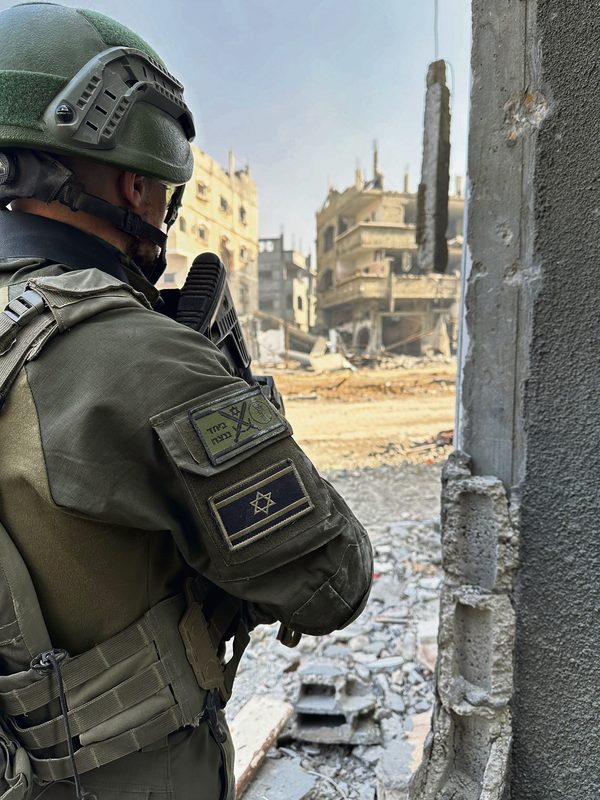
I attended Moriah College from start to finish, never truly connecting with the Jewish ethos of the school. My connection to Israel developed during my undergraduate years as I self-taught about our history and the perennial struggles of our people. I concluded that the IDF is the only entity preventing the recurrence of another Holocaust. Hence, almost 20 years ago, after completing my undergraduate studies, I made aliyah with the sole purpose of joining the IDF. It was a struggle to make a new home in a distant land without family, with only a rudimentary understanding of the language and trying to decipher a foreign culture. My only prior visit to Israel before making aliyah was on a Birthright trip the previous year. Due to my limited Hebrew, I completed five months of intensive language training (ulpan) as a civilian and an additional three months upon my initial IDF draft.
After completing army ulpan, I was drafted into the Golani Brigade – my initial preference. Golani is one of the IDF’s five infantry brigades, and its soldiers are renowned for their boldness and fearlessness. Along with almost 400 new recruits, I undertook the nearly weeklong tryout (gibush) for the special forces unit of Golani, widely regarded as the toughest and one of the most elite units in the IDF, Sayeret Golani.
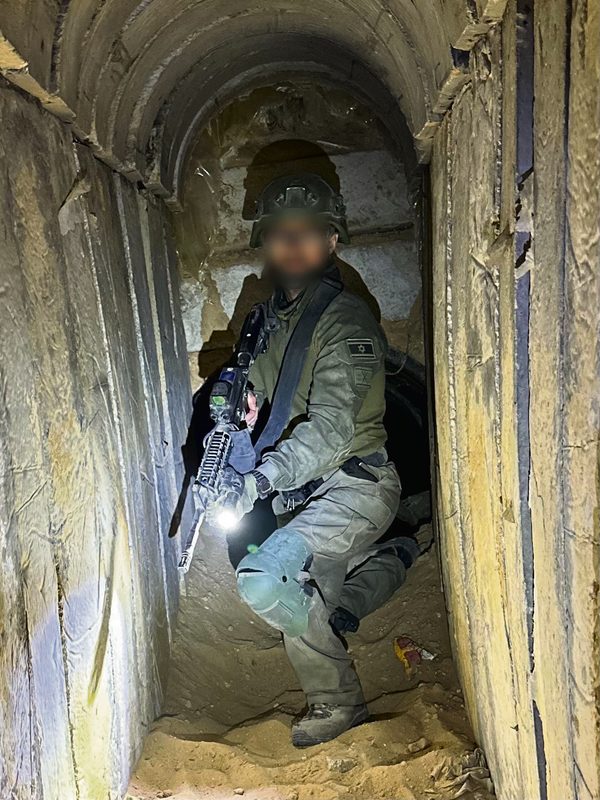
From the initial nearly 400 recruits, about 100 completed the gibush and underwent an intensive interview. Almost 30 of us were selected for the prestigious unit. After 16 months of what is widely regarded as some of the most challenging military training in the world, we graduated with fewer than 10 soldiers. To illustrate the difficulty and intensity of our training, in one particular week, during a phase known as “Area 100”, we lost half our team, who simply quit due to the challenging conditions. Being selected for the unit and subsequently completing the training was a dream come true, marking two of the most significant milestones of my life.
After completing the rigorous training program, we became active and participated in numerous covert special operations across Israel and beyond. We spent months operating in Gaza during “peacetime”, before the extensive tunnel network was established and when crude rockets began being fired at adjacent Israeli communities. Our objective during these operations was to ambush Hamas cells intent on launching rockets.
Upon concluding my service, I decided to leave Israel to pursue a master’s degree and subsequently spent the next decade working in various countries around the globe in commodities and finance. A few years ago, I returned to Sydney with my now-wife, whom I met during a stint in Johannesburg, and entered into business with my brother. I have visited Israel every few years, connecting with my IDF peers. However, I never once enlisted in reserves (miluim).
Like many of you, I can distinctly recall where I was on October 7, 2023. I was in the midst of writing a law paper as part of another master’s degree I had embarked on. Every few hours, I would check the news as a distraction and was utterly shocked by the headlines on The Times of Israel. My wife was scheduled to fly to Israel the following week to lead a special group across the country. I immediately informed her that it was more than likely this educational tour would be cancelled.
And like many of you, following October 7, I did whatever I could from Sydney to assist Israel; this included raising money for specific IDF units, participating in regular advocacy events, assisting with security, and even attending synagogue regularly. I found it impossible to focus on anything else, sleeping only a few hours a night while absorbing every piece of news and communicating with my comrades in Israel. My brother warned me on multiple occasions that I was on the verge of a breakdown. In November 2023, I decided that, to find inner peace, I needed to go to Israel and contribute to the war effort. Initially, the plan was to spend four weeks in December assisting various units with logistics, support, and equipment arrangement as a civilian.
In early December, with my wife’s blessing, I flew to Israel with over 70 waterproof jackets, kindly donated by my brother. I deliberately did not arrange any accommodation in Israel. The only thing I had organised was a rental car for the month. From my original time in the IDF, the former director of counterterrorism of my unit, Major R., had remained active in the Israeli security establishment. Major R. and I have stayed in touch since my service, meeting up each time I visit Israel – he’s invariably in uniform, engaged in some special operation.
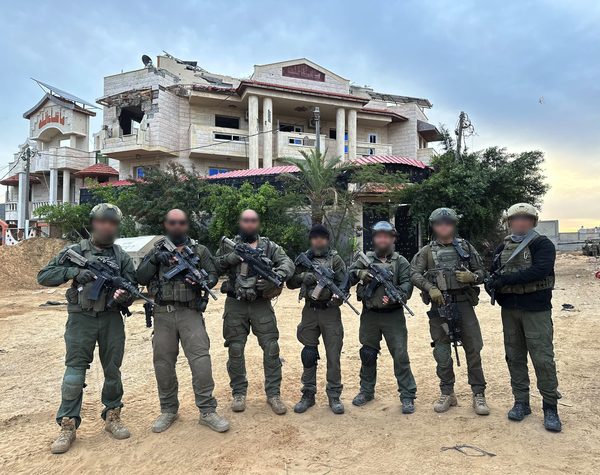
On October 7, after telling his wife that she must prepare to raise their three daughters on her own, Major R. had rushed to southern Israel with a select group of highly trained former special operators to counter the invading Hamas terrorists. As the situation stabilised, Major R. was tasked with forming highly specialised and selective teams to collaborate with Brigadier General Itzik Cohen, commander of the 162nd Division. Under Cohen’s leadership, this division is responsible for all IDF operations in northern Gaza. The teams formed by Major R. were tasked with ensuring Cohen’s security and safety, enabling him to freely enter Gaza and coordinate with various battalions and units under his command, thereby leading the war effort more effectively. This approach marked a new operational paradigm for the IDF, a lesson learned from the shortcomings of the 2006 Lebanon War, which highlighted the necessity for generals to be on the ground with their forces to make informed strategic and tactical decisions.
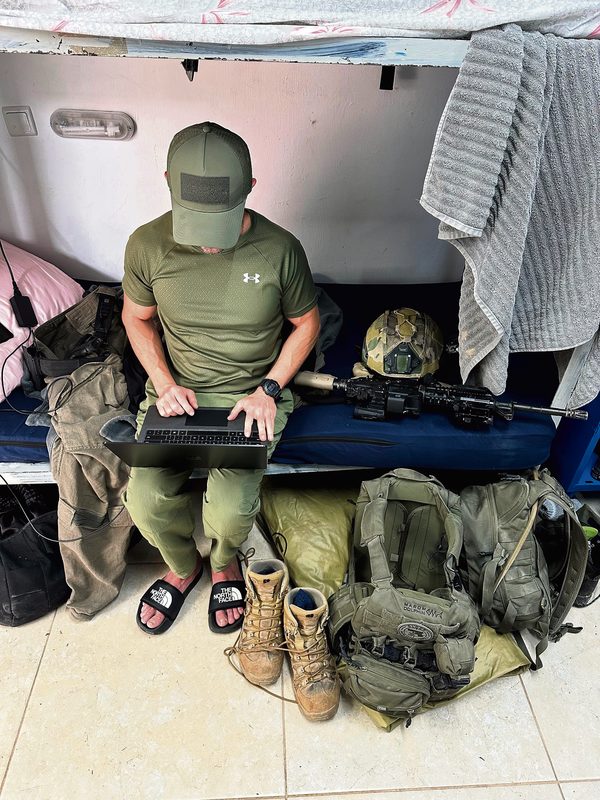
Upon arriving at the base, a few kilometres from the Gaza border, with my cases of jackets, Major R. inquired about my accommodations during my stay in Israel. I informed him that I had not made any lodging arrangements and expressed my willingness to stay on base with the teams if he agreed. I ended up sharing a small single room with five other warriors. Major R. made it clear that, despite our friendship, his role as my commanding officer took precedence, a stance I fully respected.
The teams consisted of approximately 70 soldiers; all reservists having served in Israel’s most elite units – a mandatory requirement. Additionally, all team members were subjected to a series of interviews conducted by Major R. and Captain M., the unit’s second-in-command, who had previously served in the elite Duvdevan unit.
I dedicated the initial few days to making myself useful by assisting with various tasks around the base. I created a WhatsApp group for family and close friends back home to keep them updated on my activities, serving as a quasi-diary that allowed me to document my journey and share my experiences and emotions as much as possible within reason. Despite feeling like I was making a tangible contribution, it was overwhelming to witness the warriors departing for and returning from missions in Gaza. I felt compelled to rejoin them and don the IDF uniform once again. After discussing this with Major R., my application was swiftly processed through the necessary channels, and within 24 hours, I was formally inducted into miluim. I immediately contacted my solicitor back in Sydney to ensure my will was up to date.
Having not served as an active commando in the IDF for an extended period, I was somewhat apprehensive, so I was sent to the firing range for one-on-one instruction with one of the warriors, a veteran of the Israeli Navy SEALs (Shayetet 13) and Egoz, who currently runs his own private security firm. This refresher course was crucial to ensure I was adequately prepared. It felt akin to riding a bike; although the equipment had been updated, I quickly adapted and soon found myself assigned to the most experienced team, actively participating in operations in Gaza.
WhatsApp group, December 11, 2023:
Today, after many years, I had the honour of returning to Gaza, embarking on a mission that transcends national boundaries – a mission in defence of freedom, justice and liberty.
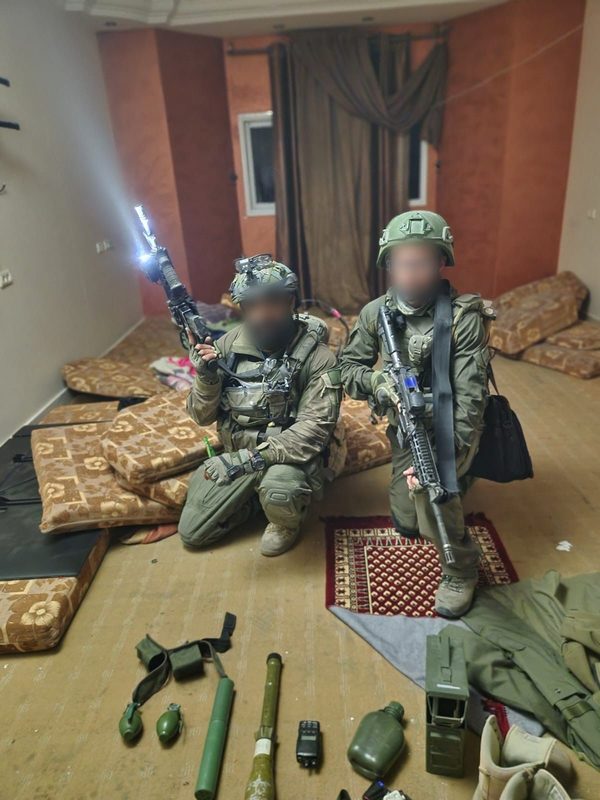
In addition to ensuring Cohen’s unrestricted movement throughout Gaza, we were also attached to other brigades, such as the 261st Infantry Brigade, which serves as the IDF’s officer school during peacetime. Our role was to provide protection for the brigade commander, Colonel Yehuda Vach, which proved to be among the most perilous, challenging, yet fulfilling experiences of my service. Vach embodies the ideal qualities of a senior military officer – determination, resilience, valour and exemplary leadership. On one occasion, we spent several days in Gaza, cut off from the outside world, engaged in frontline operations. Whenever a unit encountered enemy forces, Vach would lead us to their location to join the battle. These moments were pivotal in defining my experience in Gaza. I vividly remember running into battle to assist an elite unit that had come under attack; as we advanced, I saw two stretchers carrying the bodies of fallen IDF soldiers rush past me. It was the first time I had witnessed the death of IDF soldiers, an experience that left an indelible mark on me. The sight of their lifeless bodies, amidst the chaos of shouting and gunfire, underscored the precarious nature of life in such confrontations. Each mission felt like a gamble with our lives, and I attribute my survival to nothing more than sheer luck.
On another occasion, while assisting a different elite unit in combat, I saw an IDF commando being carried away on a stretcher, his hand severed by an explosion. Another soldier had been struck in the helmet by an AK-47 bullet; the bullet’s trajectory was visible across his helmet, narrowly missing his head.
After enduring a full day of continuous combat, without sleep, I confided in one of my teammates, Captain E., also a veteran of Sayeret Golani, with over two decades of service in the Shin Bet (Shabak). I expressed my doubts about surviving the conflict in Gaza and questioned my decision to become so deeply involved. It was a moment of vulnerability amidst the harsh realities of war. Captain E. took the time to counsel me.
WhatsApp group, December 22, 2023:
A brief WhatsApp message cannot capture the missions we completed. From rescuing injured and seeing killed Israeli soldiers to eliminating and arresting multiple Hamas terrorists, it was a week of experiences I never thought I’d witness. We discovered a Hamas tunnel and entered it to eliminate immediate threats. An improvised explosive device (IED) exploded just 10 metres from me. It made me realise that no matter how skilled or well-trained you are, sometimes you are saved by nothing more than a stroke of luck.
During another early mission briefing, we were informed that our small team would be tasked with escorting the Prime Minister of Israel, Benjamin Netanyahu, into Gaza to provide his security detail. The contrast between my recent leisure time on Bondi Beach, just a few weeks prior, and the responsibility of safeguarding the Prime Minister of Israel was stark and surreal. At Major R.’s request, I extended my stay in Israel to six weeks.
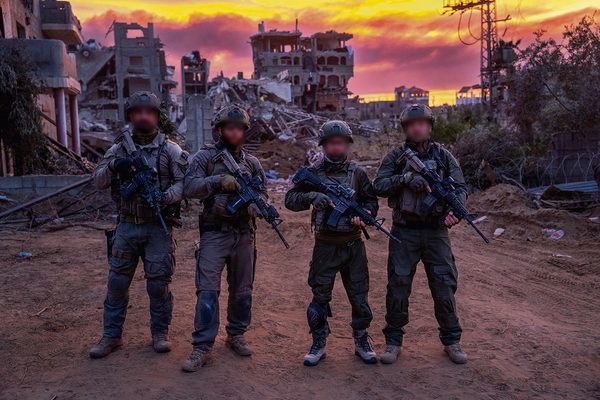
Leaving Israel was bittersweet. My wife demonstrated remarkable strength throughout this tumultuous period, and I am grateful for her unwavering support. However, parting ways with my comrades, who continue to fight in Gaza to this day, was particularly difficult. I entered the unit knowing only a few of the warriors but left having formed deep bonds with some of the most dedicated and courageous individuals I have ever met. They have given up their lives, their studies, businesses, and families. One of my closest friends in the unit, Staff Sergeant N., rushed home for a few days for the birth of his firstborn and then returned (of his own volition) to rejoin the battle.
The situation in Gaza is reminiscent of the images one sees of Berlin in 1945. Nearly every residence harbours weapons and Hamas paraphernalia, effectively transforming the area into a stronghold of terrorism. I am confident in the IDF’s ability to fulfil its strategic goals. Before my departure, Major R. implored me to return if a conflict with Lebanon were to arise. The prospect of living a “normal” life in Sydney while my brethren are fighting for their survival and the existence of the Jewish state – the sole sanctuary for Jews – is inconceivable.
WhatsApp, January 14, 2024:
Author: Thanks for making this possible, and most importantly, for making me the man I am today.
Major R.: You made you. I just opened the door; you did everything. You are always welcome here, and you have your place among us.
The writer is a member of the Sydney Jewish community.

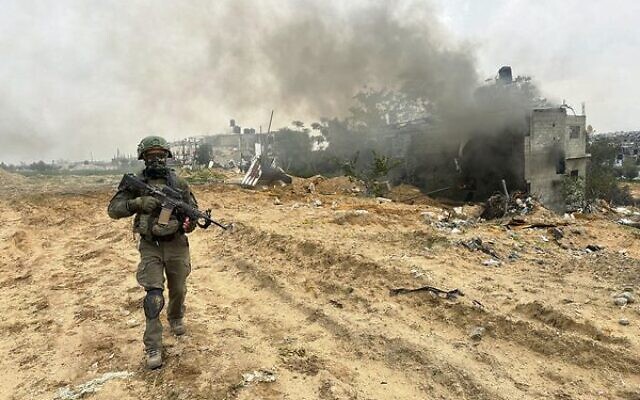
comments